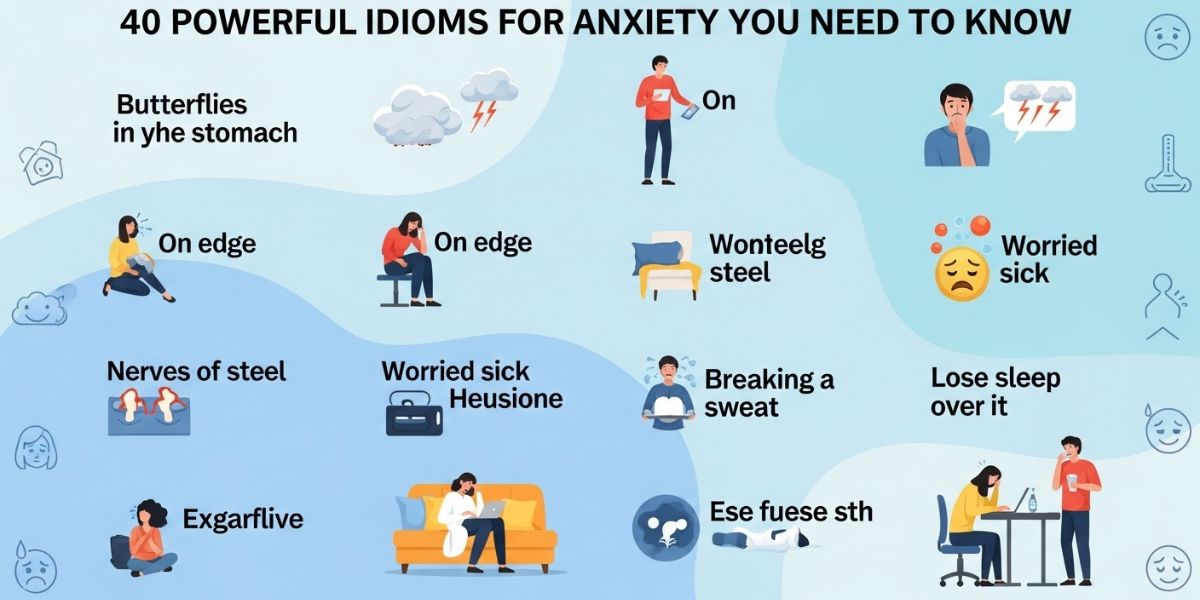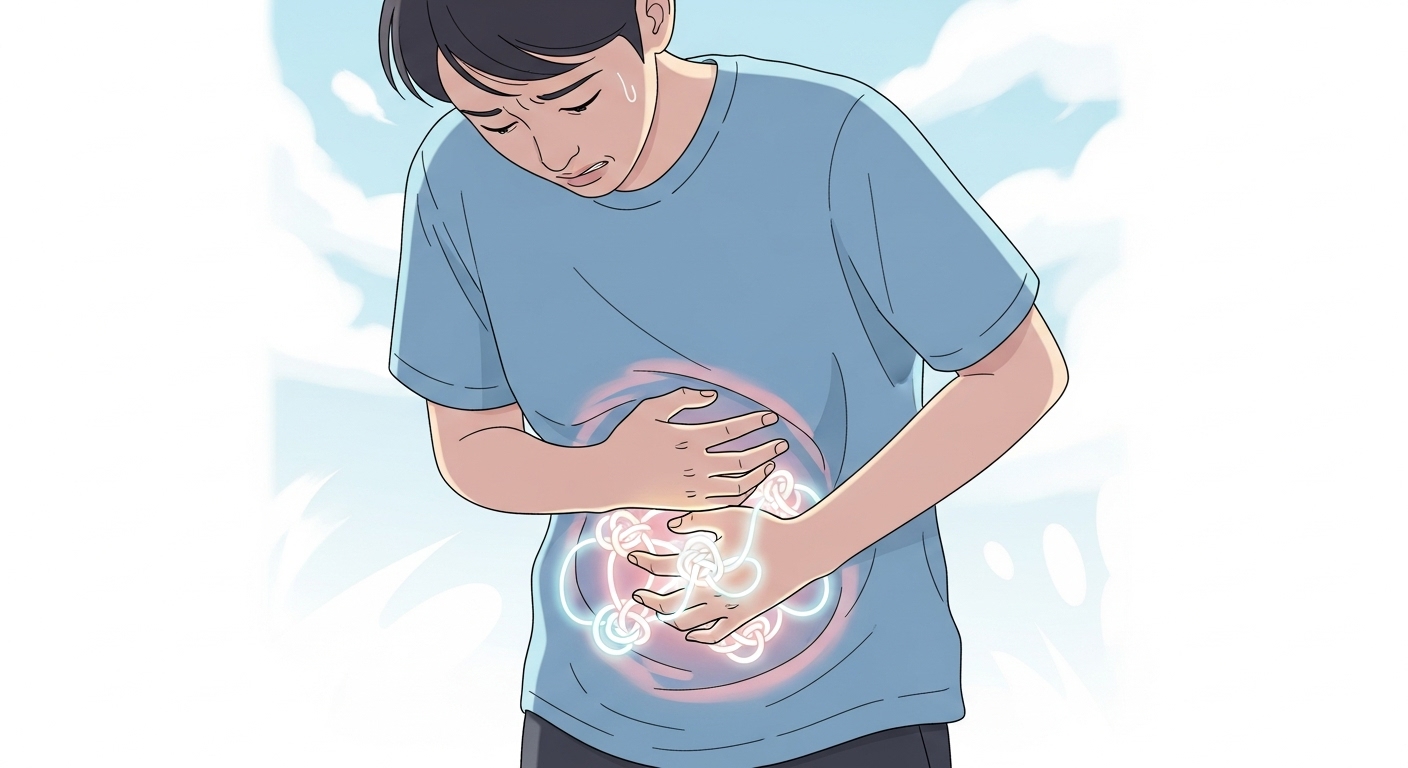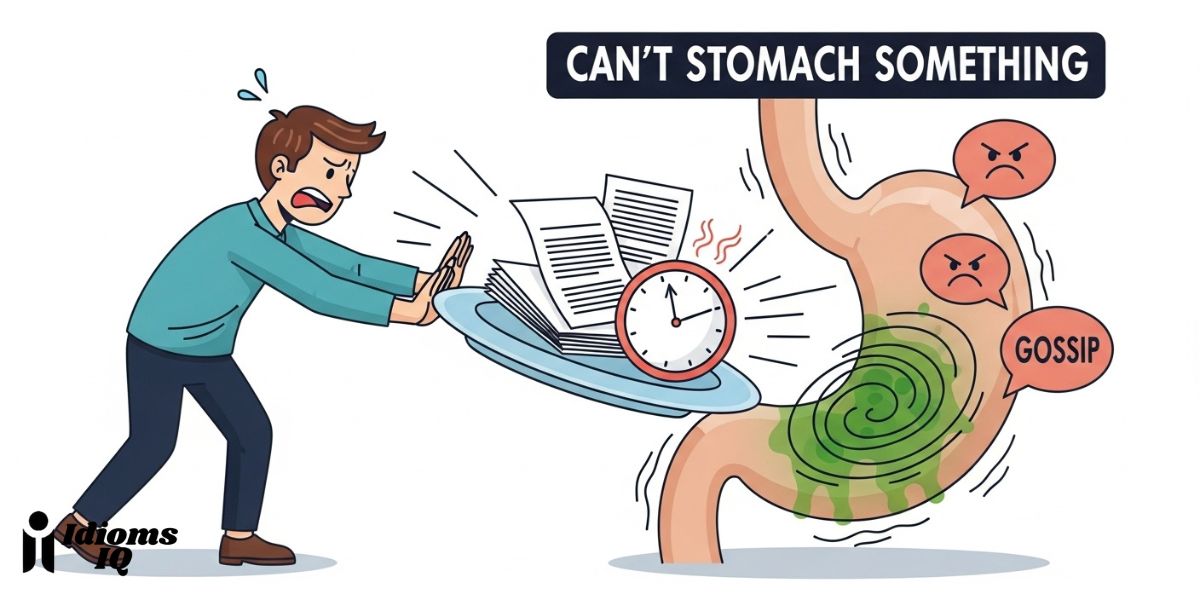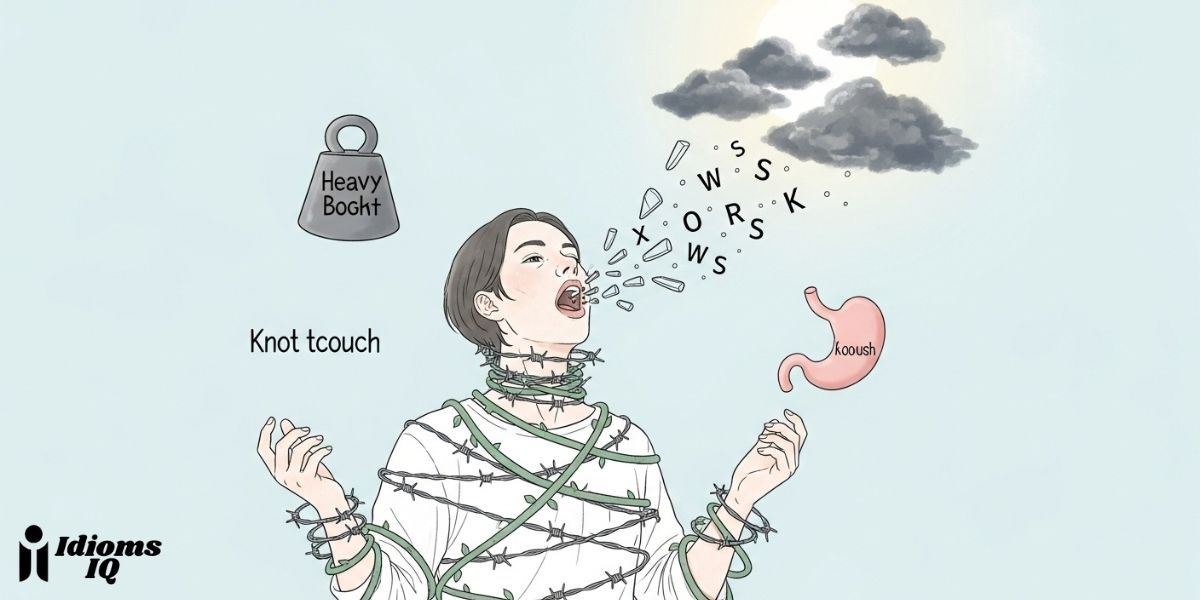
Idioms are the shorthand of human emotion, allowing us to give a name and shape to feelings that can otherwise be overwhelming and abstract. This is especially true for anxiety. When we use an anxious colloquialism like “butterflies in my stomach” or an anxiety metaphor like “the walls are closing in,” we are translating a complex internal state into a shared, understandable image.
These expressions of anxiety do more than just add color to our language; they inspire deeper thinking and bring profound clarity to our experiences. By exploring these phrases, we can better articulate our own feelings and develop greater empathy for the feelings of others, turning a vague sense of dread into something that can be named, understood, and addressed.
Anxiety often goes hand in hand with strong emotions like frustration or rage. For expressions that capture both feelings, take a look at these idioms for anger that bring emotional heat into words.
40 Idioms for Anxiety
Here are 40 common idioms, slang terms, and phrases used to describe feelings of anxiety, worry, and stress. Each entry includes a meaning, an example sentence, and alternative ways to say it.
1. On Pins and Needles
- Meaning: To be in a state of nervous anticipation or suspense.
- Use in a sentence: I’ve been on pins and needles all day, waiting for the doctor to call with the test results.
- Other ways to say it: On edge, on tenterhooks, holding one’s breath.
2. Butterflies in One’s Stomach
- Meaning: A fluttering, nervous feeling in one’s stomach, usually from excitement or anxiety.
- Use in a sentence: He always gets butterflies in his stomach before a big presentation.
- Other ways to say it: Have the jitters, feel nervous.
3. At One’s Wit’s End
- Meaning: To be so worried, confused, or annoyed that you don’t know what to do next.
- Use in a sentence: I’m at my wit’s end trying to figure out how to solve this problem.
- Other ways to say it: At the end of one’s rope, overwhelmed.
4. Heart in One’s Mouth
- Meaning: To feel extremely nervous or frightened about something.
- Use in a sentence: My heart was in my mouth as I watched the car skid on the icy road.
- Other ways to say it: Scared stiff, my heart skipped a beat.
5. Jumping Out of One’s Skin
- Meaning: To be extremely startled or acutely nervous.
- Use in a sentence: The sudden loud bang made me nearly jump out of my skin.
- Other ways to say it: Startled, jumpy, on edge.
6. A Bundle of Nerves
- Meaning: A very anxious, tense, or worried person.
- Use in a sentence: She was a bundle of nerves before her job interview.
- Other ways to say it: A nervous wreck, a worrier.
7. Walking on Eggshells
- Meaning: To be very careful about what you say or do around someone because they are easily upset or angered.
- Use in a sentence: Everyone is walking on eggshells around the boss today because the project is behind schedule.
- Other ways to say it: Being cautious, treading lightly.
8. Stomach in Knots

- Meaning: To have a tight, tense feeling in your stomach due to worry or nervousness.
- Use in a sentence: My stomach was in knots as I waited for my turn to audition.
- Other ways to say it: A pit in my stomach, feeling queasy with worry.
9. Sweating Bullets
- Meaning: To be sweating heavily, usually from nervousness, anxiety, or intense effort.
- Use in a sentence: He was sweating bullets during the police interrogation.
- Other ways to say it: Sweating profusely, breaking out in a cold sweat.
10. At the End of One’s Rope / Tether
- Meaning: To have run out of patience, endurance, or the ability to cope.
- Use in a sentence: After a week of sleepless nights with the baby, I’m at the end of my rope.
- Other ways to say it: At one’s wit’s end, at the breaking point.
11. Biting One’s Nails
- Meaning: To be very nervous or worried about a situation.
- Use in a sentence: I was biting my nails the entire time, hoping our team would win the close game.
- Other ways to say it: Worried sick, on the edge of one’s seat.
12. On Edge
- Meaning: To be tense, nervous, or easily irritated.
- Use in a sentence: The whole city has been on edge since the news of the impending storm.
- Other ways to say it: Tense, uptight, jumpy.
13. Worried Sick
- Meaning: To be extremely worried.
- Use in a sentence: My mom was worriedly sick when I didn’t answer my phone all night.
- Other ways to say it: Extremely anxious, frantic with worry.
14. A Nervous Wreck
- Meaning: A person who is emotionally or mentally distressed and overwrought with anxiety.
- Use in a sentence: By the end of finals’ week, I was a complete nervous wreck.
- Other ways to say it: A bundle of nerves, stressed out.
15. Tearing One’s Hair Out
- Meaning: To be feeling extreme anxiety, frustration, or anger.
- Use in a sentence: I’ve been tearing my hair out all day trying to fix this computer bug.
- Other ways to say it: At one’s wit’s end, extremely frustrated.
16. Mind is Racing
- Meaning: To have a rush of fast-paced, often anxious or overwhelming thoughts.
- Use in a sentence: I couldn’t sleep because my mind was racing with all the things I had to do tomorrow.
- Other ways to say it: Overthinking, can’t quiet my thoughts.
17. Have Cold Feet
- Meaning: To suddenly become too frightened to do something you had planned to do.
- Use in a sentence: The groom got cold feet on the morning of his wedding.
- Other ways to say it: Lose one’s nerve, back out.
18. A Deer in the Headlights

- Meaning: To be so frightened or surprised that you are frozen and unable to move or think.
- Use in a sentence: When the teacher asked him a question he didn’t know, he just stood there like a deer in the headlights.
- Other ways to say it: Frozen with fear, stunned.
19. On Tenterhooks
- Meaning: In a state of suspense and anxiety.
- Use in a sentence: We were on tenterhooks waiting to hear who had won the award.
- Other ways to say it: On pins and needles, in suspense.
20. Holding One’s Breath
- Meaning: To wait for something to happen in a state of anxious anticipation.
- Use in a sentence: I was holding my breath, hoping the delicate vase wouldn’t fall.
- Other ways to say it: Waiting anxiously, on the edge of one’s seat.
21. The Walls Are Closing In
- Meaning: A metaphor for anxiety where one feels trapped, panicked, and overwhelmed by a situation.
- Use in a sentence: With so many deadlines approaching, I feel like the walls are closing in on me.
- Other ways to say it: Feeling trapped, claustrophobic, under pressure.
22. Head is Spinning
- Meaning: To feel dizzy, confused, or overwhelmed with too much information or activity.
- Use in a sentence: After the three-hour meeting, my head was spinning.
- Other ways to say it: Bewildered, my mind is a whirl.
23. Break Out in a Cold Sweat
- Meaning: To begin sweating from fear, nervousness, or shock.
- Use in a sentence: Thinking about public speaking makes me break out in a cold sweat.
- Other ways to say it: Sweating bullets, feel a chill.
24. My Heart Skipped a Beat
- Meaning: A physical sensation of a brief flutter or pause in one’s heartbeat due to fright, excitement, or shock.
- Use in a sentence: My heart skipped a beat when I thought I saw a shadow in the empty house.
- Other ways to say it: My heart jumped, startled.
25. Scared Stiff
- Meaning: To be so frightened that you cannot move.
- Use in a sentence: He was scared stiff when the guard dog started barking at him.
- Other ways to say it: Petrified, frozen with fear.
26. Shaking Like a Leaf
- Meaning: To be trembling a great deal from fear or nervousness.
- Use in a sentence: She was shaking like a leaf before her big performance.
- Other ways to say it: Trembling, quaking in one’s boots.
27. White as a Ghost / Sheet
- Meaning: To have a very pale face due to fear, shock, or illness.
- Use in a sentence: You’re as white as a ghost! Did something happen?
- Other ways to say it: Pale with fear, ashen-faced.
28. Get Worked Up
- Meaning: To become agitated, angry, or anxious about something.
- Use in a sentence: Don’t get worked up over such a small problem; we can fix it.
- Other ways to say it: Get stressed out, become agitated.
29. Freaking Out
- Meaning: (Anxiety slang) To panic or become highly agitated and irrational.
- Use in a sentence: He started freaking out when he realized he had lost his wallet.
- Other ways to say it: Panicking, losing it.
30. Losing My Mind / Marbles
- Meaning: To feel as though you are going crazy from stress, worry, or frustration.
- Use in a sentence: I think I’m losing my mind trying to manage work and school at the same time.
- Other ways to say it: Going crazy, at the breaking point.
31. My Blood Ran Cold
- Meaning: A feeling of sudden, intense fear or horror.
- Use in a sentence: My blood ran cold when I heard the scream in the middle of the night.
- Other ways to say it: A chill down my spine, horrified.
32. The Jitters
- Meaning: A feeling of nervousness or slight shaking.
- Use in a sentence: I always get the jitters before I have to fly on a plane.
- Other ways to say it: Butterflies, nerves.
33. Heebie-Jeebies
- Meaning: A feeling of anxiety, fear, or creepiness.
- Use in a sentence: That old, abandoned house gives me the heebie-jeebies.
- Other ways to say it: The creeps, the willies.
34. Feel the Pressure
- Meaning: To feel the stress of a demanding situation.
- Use in a sentence: As the deadline approached, the team really started to feel the pressure.
- Other ways to say it: Under stress, feeling the heat.
35. Under the Gun
- Meaning: To be under intense pressure to do something by a certain time.
- Use in a sentence: We’re all under the gun to finish this report by Friday.
- Other ways to say it: Under pressure, on a tight deadline.
36. My Nerves Are Shot
- Meaning: To be completely exhausted or worn out by stress and anxiety.
- Use in a sentence: After that week of constant emergencies, my nerves are completely shot.
- Other ways to say it: Stressed out, frayed, a nervous wreck.
37. A Pit in My Stomach
- Meaning: A heavy, sinking feeling in the stomach caused by dread, fear, or disappointment.
- Use in a sentence: I had a pit in my stomach the whole time I waited for the bad news.
- Other ways to say it: A sinking feeling, a sense of dread.
38. Strung Out
- Meaning: (Slang) To be mentally and physically exhausted from prolonged stress or anxiety.
- Use in a sentence: He looked completely strung out after studying for his exams for 48 hours straight.
- Other ways to say it: Worn out, frazzled, burnt out.
39. Can’t Stomach Something

- Meaning: To be unable to tolerate or endure a stressful or unpleasant situation.
- Use in a sentence: I can’t stomach the thought of another long, pointless meeting.
- Other ways to say it: Can’t stand, can’t bear.
40. Drowning in Worry
- Meaning: A metaphor for feeling completely submerged and overwhelmed by anxiety.
- Use in a sentence: She felt like she was drowning in worry about her financial problems.
- Other ways to say it: Overwhelmed by anxiety, consumed by worry.
Fill-in-the-Blank Exercise
Complete each sentence with the most appropriate anxiety idiom from the list.
- I’m so nervous about the results, I feel like I have __________________ in my stomach.
- He was so scared by the horror movie that he was __________________ the whole time.
- She’s complete __________________ before any exam.
- With three kids and a new job, she feels like she’s at the __________________.
- When he asked me to speak in front of 500 people, I almost __________________.
- The entire office is __________________ around the new manager.
- I have a deep __________________ in my stomach every time I have to visit the dentist.
- My __________________ when I couldn’t find my son in the crowded store.
- He’s been __________________ all week, waiting for the big news.
- With all the pressure from work, I feel like the __________________ are closing in.
Answer Key
- butterflies
- shaking like a leaf
- nervous wreck / bundle of nerves
- end of her rope
- i got cold feet
- walking on eggshells
- pit
- blood ran cold
- on pins and needles / on tenterhooks
- Walls
Conclusion
The vast vocabulary we use to describe anxiety—from physical sensations like a “stomach in knots” to mental states like a “racing mind”—highlights how universal this emotion is. Learning and using these idioms does more than just make our language more descriptive; it provides us with the tools to articulate our internal experiences with precision.
This practice can significantly improve our emotional intelligence, allowing us to better understand ourselves and communicate our needs to others. Recognizing these expressions of worry fosters empathy and reminds us that while anxiety can feel isolating, the language we use to describe it connects us all.






